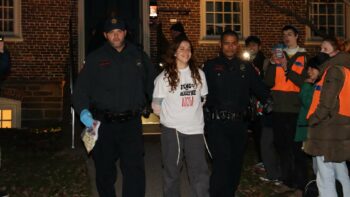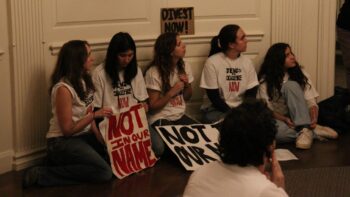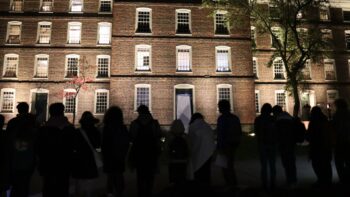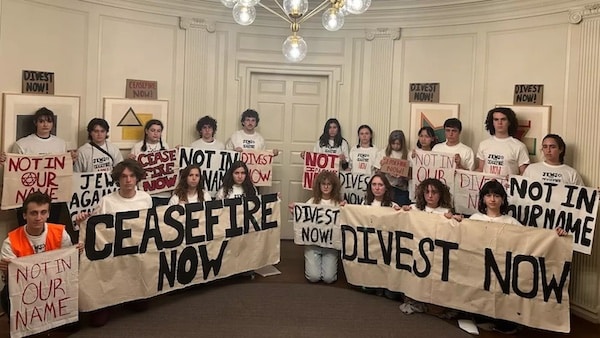They were sitting in a circle when the police arrived.
“Where you go, I will go, my friend,” the students chanted as police officers began separating each of the 20 students before handcuffing them.
“Because your people are my people, your people are mine, your people are my people, your Divine my Divine,” they continued.
Where you go, I will go, my friend.
The students, all Jewish, and part of a group called Jews for Ceasefire Now (JFCN) had been engaged in a five-hour sit-in outside the office of Brown University President Christina Paxon demanding the university divest from Israeli companies and join the growing call for an immediate ceasefire.
Just as the clock was about to strike five – the time the office closed – the students were told to go home.
When they didn’t, the police were called.

Around 20 Jewish students were arrested by police on 8 November (supplied)
That was on 8 November.
Two weeks later, it is unclear whether the charge of “trespassing” will be dropped or whether the university will initiate disciplinary action against them. Still the students believe their actions were both warranted and necessary.
Several students at Brown told Middle East Eye that the arrest of the 20 Jewish students lifted the mask on the university as a bastion of liberal values, and highlighted how entrenched anti-Palestinian sentiment was.
The incident, they said, encapsulated the level of prejudice that students advocating for Palestinians are being subjected to across the country, be it at Columbia University in New York, Harvard in Massachussetts, or Stanford in California.
Following the Hamas-led attacks on Israel on 7 October, in which 1,200 Israelis were killed, several Jewish students at Brown watched in horror as the Palestinian death toll in Gaza began to mount amid Israel’s bombing campaign.
Jewish Students like Ariela Rosenzweig, 22, and Lilly Gardner, 20, already involved with Students for Justice in Palestine (SJP), participated in several protests in Providence, but were horrified as Brown failed to provide nuanced or accurate guidance in its public statements.
Later, they observed their Palestinian classmates and friends being harassed and verbally abused, with what they said was little help from university administrators.
As the days rolled on and Israel showed no signs halting its air strikes, the duo, along with a dozen other Jewish students, decided to take matters into their own hands.
They felt they needed to take action as Jews as the mainstream media deepened their anti-Palestinian rhetoric, including characterising Palestinian groups, slogans and protesters as terrorists or as antisemitic.
“I think as a group, what we understood, as Jewish students, we had a responsibility to meet this moment with trying to actually counter the narrative, and then also to see how the university would respond to us [as Jewish students] exercising free speech and engaging in peaceful political protest,” Lilly Gardner, who was arrested on 8 November, told MEE.
Likewise, Rosenzweig, who was also arrested, said it was the university’s attitude that had led them to take direct action.
“They had given us no outlets, and had shut down every attempt at conversation,” Rosenzweig said.

Around 20 Jewish students were arrested by police on November (supplied)
Around 20 Jewish students were arrested by police on 8 November (supplied)
In response to a letter signed by 160 members of faculty, urging Paxon to endorse a ceasefire and to affirm academic freedom, the university president reportedly said there would be no “Palestine exception” to free expression. According to the Brown Daily Herald, she declined to comment on the matter of a ceasefire.
Across the US, students who have dared to express their support for Palestine, or have called for a ceasefire, as the death toll in Gaza has reportedly moved beyond 14,000, including an estimated 5,000 children, have faced a deluge of attacks.
Several elite universities have seen donors pull their funding, or withdraw job offers from students, or even have mobile billboards circulating on their campuses bearing the names and photographs of faculty or students who have shown empathy for Palestine.
Though Brown University has been spared the mobile billboards and the doxxing campaigns, Palestinian and Arab students have faced discrimination and bigotry over the past month.
“The university administration was quick to release a statement of support for Israeli victims of 7 October and offered resources to Israeli and Jewish students, but failed to do the same for Arab and Palestinian students in the following weeks,” Aboud Ashhab, a Palestinian student at Brown, told MEE.
Likewise, Talia Sawiris, another student at Brown, told MEE that the university’s failure to acknowledge the occupation of the West Bank or the 16-year-long seige of Gaza, was a disservice to the student community.
“When discourse becomes toxic on campus, universities should have a duty to provide context and nuance, as opposed to releasing one-sided statements or ‘neutral statements’ that neglect 70 years’ worth of context, and privileges the narrative of the oppressor,” Sawiris said.
Sawiris said the university has also been unwilling to properly recognise which students may be more susceptible to harm.
Both Rosenzweig and Gardner agreed that although there had been several reports of a rise in antisemitic incidents on campus, little has been done to discern between real antisemitism and complaints about pro-Palestinian advocacy.
“I think many of us were personally called into action in this moment beyond simply the level of violence and atrocity that is happening, but more broadly, because Zionism has become a prerequisite for Judaism,” said Gardner.
She added that though she doesn’t want to downplay antisemitism in the US, she has felt “nothing but safe on Brown University’s campus, and especially nothing but safe in pro-Palestinian spaces, such as SJP, which have often been the first to condemn antisemitism in a very clear way”.
Rosenzweig said:
I think we’ve heard of a lot of reports and claims of antisemitism, which I would consider to be entirely false.
Brown University Hilell, the Zionist student group, did not reply to MEE’s request for comment.
Prayers, protest and peace
On 8 November, as the 20 Jewish students were escorted one by one by police officers to a van, a crowd of around 500 students who had assembled to show solidarity and bear witness, sang a tehillim, a religious poem adapted from the Old Testament, as they passed by.
“Olam chesed yibaneh yai dai dai, yai dai dai [The world will be built with love],” the crowd chanted as each person was placed into the van.
Since then, the admiration for the 20 students has only grown among students and faculty.
Students with JFCN said that their cohort had jumped from 10-15 to around 70 volunteers.

Hundreds stood outside to show their solidarity with the students conducting a sit-in (Supplied)
“I wouldn’t ever have imagined that such a diverse group of Jewish students on campus would have come together under one banner,” Mica Maltzman, a 20-year-old student with JFCN, told MEE.
“Obviously, there are still students who go to Hillel and are active and have been students for Israel. But it really has drawn from Jewish students from all walks of life, whether from families who are in Israel or students who grew up in very leftist communities,” said Maltzman.
At the faculty level, more than 200 academics at Brown have since signed a letter calling on the university to drop all legal charges charges against the students, to exempt the students from any university disciplinary proceedings and to open a campus-wide conversation that engages seriously with the students’ demands.
“We are deeply dismayed by the decision to have the students arrested, and we call upon our university leadership to engage with the deeper stakes and matters of conscience that our students have sought to foreground at this difficult time,” the signatories wrote, urging the administrators to consider acts of civil disobedience at Brown in the past that led divestment from apartheid South Africa.
But Brian Clarke, Brown University’s spokesman, told MEE that the institution’s policy wholeheartedly accepted protest as “a necessary and acceptable means of expression on campus”.
He added:
They also make clear that because Brown respects and upholds freedom of expression, the ‘time, place and manner’ of exercising those rights is subject to regulation only ‘to prevent interference with the normal functions of the University’. These 20 particular students were arrested for violating law in regard to wilful trespass within school buildings.
The City of Providence Police Department did not reply to MEE’s request for comment.
Still, the efforts have inspired and bouyed Palestinians at Brown.
Sawiris, the student organiser, said she was immensely proud of the JFCN for “standing up for Palestinian liberation and echoing the demands of SJP and PSC”.
“In particular, it is honourable that they recognise their privilege as predominantly white Jews and have leveraged that, putting their bodies and futures on the line,” Sawiris said.
“It is inspiring to see young people across the nation who are banding together, as Jews, Arabs, Palestinians and more, to build multicultural coalitions and stand up for Palestinian liberation. This is perhaps naive, but it goes to show that divisions are created by states and regimes, and not by individuals.” she added.

